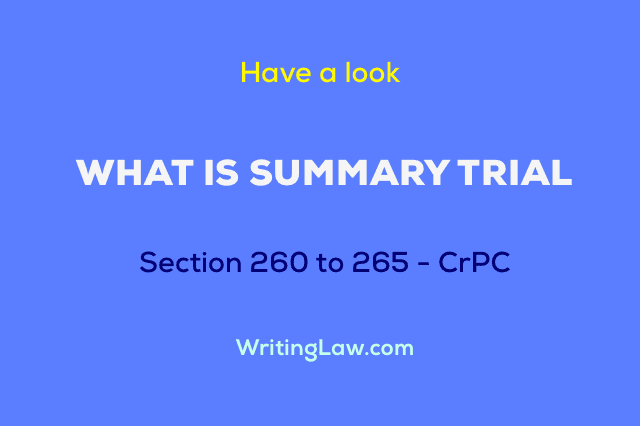
Summary trial has been discussed under Chapter 21 of the Criminal Procedure Code under section 260 to 265. The procedure for summary trial is the same as that of summons cases under Chapter 20 of the Criminal Procedure Code. In the summary trial, the punishment cannot be for more than three months.
- Competent Magistrate
- Offences that can be tried summarily
- Procedure
- Punishment in Summary Trials
- Record in Summary Trial
- Judgement in cases tried summarily
Competent Magistrate
The following Magistrate may try the case summarily:
- Chief Judicial Magistrate – Section 260(1)(a)
- Metropolitan Magistrate – section 260(1)(b)
- Judicial Magistrate Class I empowered by High Court – Section 260(1)(c)
- Judicial Magistrate Class II empowered by High Court- Section 261
Offences that can be tried summarily
Offences listed under section 260(1)(i) to 260(1)(ix) can be tried summarily;
- (i) offences not punishable with death, life imprisonment, or sentence of more than two years
- (ii) theft (value of stolen goods not more than two thousand rupees)
- (iii) receiving and retaining stolen property (the value of stolen goods not more than two thousand rupees)
- (iv)assistance in concealment and disposal of stolen property (the value of stolen goods not more than two thousand rupees)
- (v) Section 454 and 456 IPC
- (vi) insult with intent to provoke a breach of peace and criminal intimidation
- (vii) abetment of any of the listed offences
- (viii) the attempt of any of the listed offences
- (ix) act regarding which a complaint has been made under section 20 of the Cattle Trespass Act 1871
Procedure
The procedure to be followed in the summary trial is the same as that in summons cases.
- Section 251 – substance of accusation to be stated
- Section 252 – conviction on plea of guilty
- Section 253 – conviction on plea of guilty in absence of accused in petty cases
- Section 254 – procedure when not convicted
- Section 255 – acquittal or conviction
- Section 256 – non-appearance or death of the complainant
- Section 257 – withdrawal of the complaint
- Section 258 – power to stop proceedings in certain cases
- Section 259 – power of court to convert summon cases to warrant case
Punishment in Summary Trials
According to section 262(2), punishment in a summary trial cannot exceed more than three months.
According to section 260(2), during the summary trial, if it appears to the Magistrate that it is undesirable to try the case summarily, the Magistrate may recall the witness already examined and rehear the case in any other manner provided in the code.
Record in Summary Trial
The following information is to be filled in the form prescribed by the state government:
- Serial number of case
- Date of commission of the offence
- Date of report or complaint
- Name of complainant
- Name parentage residence of accused
- Offence complained of
- Plea of accused and his examination
- Finding
- The sentence or other final order
- The date on which the proceedings terminated
Judgement in cases tried summarily
According to section 264, in a summary trial in which the accused doesn’t plead guilty, the Magistrate shall record the substance of the evidence, and he shall then deliver a judgement.
According to section 265, High Court may authorize any Magistrate or any officer appointed by Chief Judicial Magistrate to try a case summarily or to prepare such record or to give judgement.
- What Is a Foreign Judgement and When It’s Not Binding in India - 26th July 2022
- What Are Second Appeals Under Civil Law - 23rd June 2022
- Civil Appeal as Per the Civil Procedure Code - 12th June 2022







